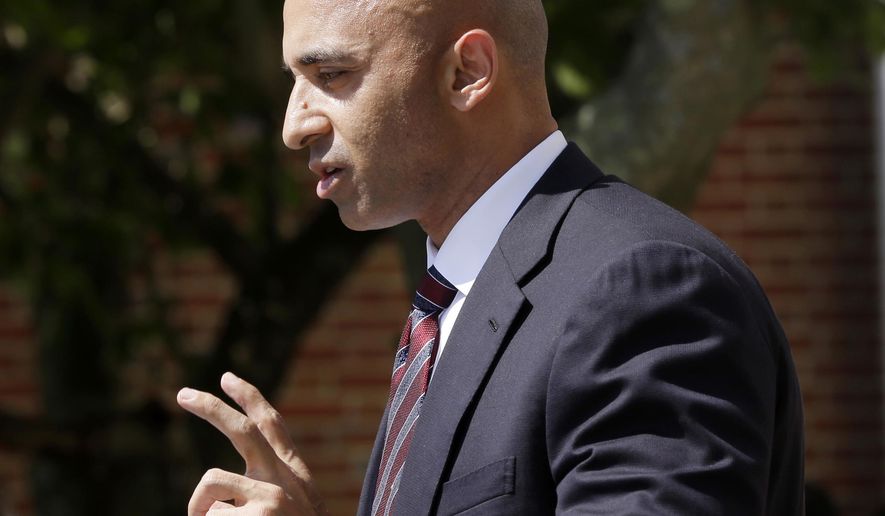OPINION:
As the United States looks for ways to de-escalate the growing and dangerous dispute between Qatar and its neighbors Bahrain, Saudi Arabia and the United Arab Emirates (UAE), two fundamental points have to inform the Trump foreign policy team. First is the importance of uninterrupted flow of oil and gas from the Persian Gulf to world markets. Second is to ensure that Tehran’s bad behavior is contained, because the Iranian regime remains the most serious threat to regional security in the broader Middle East and is the major sponsor of terrorism.
The danger of allowing this crisis to further escalate has serious global and regional consequences. Disruption of cargos carrying Qatari liquefied natural gas to Asia can literally turn the lights out in Beijing, Tokyo and Seoul. The global economy cannot afford any disruption to the flow of hydrocarbons from the Persian Gulf. And furthermore, the last thing Washington needs is for Qatar, in an act of desperation, to accept the Iranian regime’s offer to station 10,000 Revolutionary Guards on its soil. Qatar is home to 8,500 American troops and hosts the largest prepositioning American base in the world.
In order to de-escalate this crisis immediately, the United States must work with Qatar to address some of the legitimate concerns raised by Bahrain, Egypt, Saudi Arabia and the UAE.
First, Washington must ask Qatar to restructure Al Jazeera. When I first met with the former emir of Qatar, Sheikh Hamad Al Thani, he described Al Jazeera as a “free press zone” within the Arab world. Sadly, that “free press zone” has gone off track. Doha must immediately fire its pro-Muslim Brotherhood journalists and put an end to the nonsense spewed by so-called clerics like Yusuf Qaradawi. Instead, Qatar must take advantage of the fact that it hosts Northwestern University’s School of Journalism and train Qataris to fill in those positions.
Second, Qatar’s assistance to Hamas must become transparent. In 1999 when King Abdullah of Jordan exiled the leaders of Hamas to Qatar, Doha took them in. For reasons that are not clear, Qatar’s assistance morphed into a full-fledged campaign of funding Hamas and, in some cases, money flowed to the extremist elements within Hamas. Moving forward, Washington must insist that any future assistance to the people of the Gaza Strip be done through American nonprofits or private sector. In short, if Qatar wants to fund a hospital, repair a damaged water pipe or build a desalination facility in the Gaza Strip, it has the right to do so, but the flow of funds has to be through an American company whose books can be audited by the State Department. The same structure should be put in place for Qatar’s funding that flows to Syria and Libya.
Finally, Washington must obtain a written pledge from Qatar that it will end its assistance to the Muslim Brotherhood. In exchange, Qatar should get assurances from the United States that it will no longer be subject of ad hoc pressures from Egypt, Saudi Arabia, Bahrain and the UAE.
Beyond these three immediate steps, the United States must encourage Qatar, Bahrain, Saudi Arabia and the UAE to take the following initiatives. Washington must encourage a regional gas swap agreement between Caspian gas producers like Azerbaijan, Turkmenistan and Qatar. In essence, Azerbaijan (and at a later stage Turkmenistan) agrees to sell natural gas to Bahrain, Saudi Arabia and Kuwait. The physical volumes would be provided by Qatar. In exchange, Azerbaijan provides natural gas to Europe on behalf of Qatar. The higher volumes of gas delivered into Europe will enhance the Continent’s energy security, making it less reliant on Russia and its unpredictable leader.
In his meeting with Qatar’s leader, Sheikh Tamim, in Riyadh last month, President Trump spoke of selling “beautiful weapons” to Qatar. What Qatar has and American needs is money to build the “beautiful roads and bridges” that America so desperately needs. The president may want to ask that Qatar commit to investing in American infrastructure instead of selling Doha more arms. Qatar can become a reliable partner for Mr. Trump and his quest to “Make American Great Again.”
Finally, the United States should insist that a portion of the $300 billion spending undertaken by Qatar to host the World Cup in 2022 be spent in Bahrain so as it allow its smaller neighbor to host at least one of the World Cup group events. Bahrain is home to the U.S. Fifth Fleet but is facing an existential threat from the Iranian regime (Tehran considers Bahrain a province of Iran). Furthermore, Bahrain’s economy is facing headwinds due to low oil prices. American encouragement of a Qatari investment in Bahrain will create jobs within the kingdom and help smooth the differences that currently plague relations between Doha and Manama.
President Trump has the attention of powerful and wealthy players in the Persian Gulf. He must use his newfound power to broker an end to this regional crisis in such a way that unites our allies in the region against the twin dangers of Islamic extremism and the Iranian regime.
• S. Rob Sobhani is CEO of Caspian Group Holdings.




Please read our comment policy before commenting.